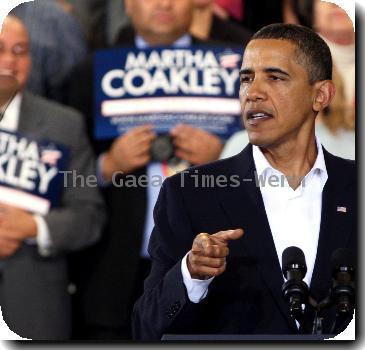1st primary of year to decide which Illinois Dems make challenging runs for governor, Senate
By Christopher Wills, APTuesday, February 2, 2010
1st primary of year to decide showdown in Illinois
CHICAGO — Illinois Democrats in the nation’s first primary picked candidates to defend the governor’s office and a U.S. Senate seat from the onslaught of a Republican Party eager to exploit Democratic disarray in President Barack Obama’s home state.
The targets include the Senate seat Obama held before moving to the White House. Mark Kirk, a moderate five-term congressman, had a huge lead in early returns — 62 percent to 18 percent for his nearest competitor, Patrick Hughes, with one-third of precincts reporting.
The race appeared to be much closer on the Democratic side, with Illinois Treasurer Alexi Giannoulias slightly ahead of former prosecutor David Hoffman.
Losing the Senate seat in the increasingly Democratic-leaning state would be a bigger personal embarrassment for Obama than Republican Scott Brown’s upset victory last month in Massachusetts, which took away the late Edward M. Kennedy’s Senate seat.
The GOP also hopes to win the governor’s mansion after years of turmoil under Democrats. First Gov. Rod Blagojevich was arrested and kicked out of office on federal corruption charges, including allegations he tried to sell an appointment to Obama’s seat. Then his successor, Pat Quinn, got into a vicious primary battle.
Quinn accused his opponent, Comptroller Dan Hynes, of ducking tough budget decisions, ignoring the desecration of human remains at a historic black cemetery and trying to divide voters along racial lines. Hynes called Quinn indecisive and incompetent, charging that he also wants to raise taxes on middle-class voters.
Election officials said voter turnout was low across the state, and many voters seemed fed up with politicians.
“I’m tired of what’s going on, from the top to the bottom,” said Richard Saunders, 83, who cast a Republican ballot in the southwestern Illinois city of Troy. “I hope we can do something with our one little vote.”
The governor’s race, for both Democrats and Republicans, was close in early returns.
The nominees who emerge from the bruising midterm primary will fight for the chance to run a state so deep in debt it can’t pay bills on time and must consider painful service cuts, higher taxes or both.
Quinn sought a full term after being thrust into office a year ago when Blagojevich was expelled. After walking to vote near his home, Quinn sounded prepared for victory or defeat.
“There’s an old saying, ‘One day a peacock, the next day a feather duster,’” he said. “I have to be ready for anything.”
It initially appeared Quinn would easily win the Democratic nomination. But that was before The Associated Press disclosed that his administration was quietly granting early release to some prison inmates, including violent offenders. It also was before Hynes introduced an ad featuring footage of the late Chicago Mayor Harold Washington — a revered figure to many black voters — harshly criticizing Quinn.
Quinn responded by linking Hynes, whose office regulates cemetery finances, to the scandal at a historic black cemetery outside Chicago where bodies were double-stacked in graves or dumped in weeds. He alleged Hynes ignored the atrocities at Burr Oak Cemetery, the resting place of civil rights-era lynching victim Emmett Till and other prominent African-Americans, because he lacks “human decency.”
Democratic voter Rich Hammer, 58, said he wasn’t excited about either candidate. But the unemployed Chicago resident decided against voting for Quinn because he served as lieutenant governor when Blagojevich was in power. Hammer said that association, “albeit innocent,” tainted Quinn.
Republicans believe they have a strong shot at the governor’s mansion because both Democratic candidates proposed income tax increases and because Democrats have been so tainted by Blagojevich.
Most of the exchanges among the Republican candidates for governor focused on who was most adamantly opposed to raising taxes. Polls suggested the top contenders were state Sen. Kirk Dillard, businessman Andy McKenna and former Attorney General Jim Ryan.
The Blagojevich scandal could play a role in the Senate race as well. The incumbent, Roland Burris, chose not to run because the former governor had appointed him to the seat — sullying his reputation so badly he could find little political support.
Obama, who cast an absentee ballot, tried to recruit some big-name Democrats, including popular Illinois Attorney General Lisa Madigan, but came up empty.
The Democrats who did get in the race have their own troubles. Giannoulias, the leader in the polls, has limited experience — a single term as state treasurer and a job at a family bank now in financial trouble. Chicago Urban League President Cheryle Jackson is a former Blagojevich aide. Hoffman is an unknown to most voters.
Republican leaders rallied around Kirk as their choice for the party nomination, despite complaints from some GOP activists that Kirk’s support of gun control and abortion rights makes him too liberal.
Associated Press Writers Carla K. Johnson and Sophia Tareen in Chicago, Jim Suhr in Troy, and AP Photographer M. Spencer Green in Chicago contributed to this report.
Tags: African-americans, Barack Obama, Chicago, Geography, Illinois, North America, United States

